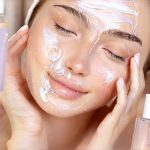Urinary tract infections (UTIs) are incredibly common, particularly among women due to anatomical factors. Most people associate UTIs with painful urination, frequent urges to go, and discomfort in the pelvic region – understandably so. However, a growing number of women report experiencing seemingly unrelated skin issues concurrently with UTIs, specifically breakouts or flare-ups of existing skin conditions. This connection often leaves individuals frustrated and searching for answers, wondering if their UTI is somehow triggering these dermatological events. While research directly linking the two isn’t extensive, the potential mechanisms at play are complex and warrant a closer look, exploring how systemic inflammation, gut health disruption, and immune responses might be involved.
The surprising link between UTIs and skin breakouts isn’t necessarily about direct bacterial transmission. It’s more about what happens within the body when an infection takes hold. A UTI is essentially an inflammatory event; your immune system recognizes a foreign invader (bacteria) and launches a defense, releasing signaling molecules called cytokines. These cytokines aren’t localized – they circulate throughout the bloodstream, potentially affecting other systems in the body. Additionally, the stress on the body from fighting off infection can also impact hormones and gut health, creating an environment where skin problems can emerge or worsen. Understanding this systemic interplay is key to deciphering why a UTI might seemingly trigger skin issues.
The Inflammation-Skin Connection
Inflammation is at the heart of many chronic conditions, including both UTIs and certain types of acne or skin sensitivities. When your body is battling a UTI, the resulting inflammation isn’t just confined to the urinary tract. It becomes systemic, meaning it affects multiple organs and systems. This widespread inflammatory response can have several consequences for the skin:
- Increased sebum production: Inflammation can stimulate sebaceous glands to produce more oil, potentially leading to clogged pores and acne breakouts.
- Compromised skin barrier function: Chronic inflammation weakens the skin’s natural protective barrier, making it more susceptible to irritation and external aggressors. This is particularly problematic for individuals with sensitive skin or conditions like eczema.
- Exacerbation of existing conditions: For those already prone to skin issues like rosacea, psoriasis, or dermatitis, systemic inflammation from a UTI can trigger flare-ups, intensifying symptoms like redness, itching, and scaling.
It’s important to note that the type of inflammatory response also matters. Different bacteria causing UTIs might elicit slightly different immune responses, potentially influencing the specific types of skin issues that arise. Furthermore, individual sensitivity to inflammation varies greatly; what causes a mild breakout in one person could trigger a severe flare-up in another. The body’s overall inflammatory load – meaning existing chronic inflammation from other sources (stress, diet, lifestyle) – also plays a role, making some individuals more vulnerable than others. Inflammation is rarely isolated and often creates a cascading effect throughout the body. Understanding why do utis persist can help manage this inflammatory response.
The gut microbiome, often referred to as our “second brain,” is intimately connected with both immune function and skin health. Antibiotics, frequently prescribed for UTIs, can significantly disrupt this delicate ecosystem. While necessary to combat the infection, antibiotic use doesn’t discriminate – it kills both harmful and beneficial bacteria in the gut. This disruption leads to:
- Reduced microbial diversity: A less diverse gut microbiome is associated with a weakened immune system and increased inflammation.
- Increased intestinal permeability (“leaky gut”): Disruption of the gut barrier allows undigested food particles, toxins, and bacteria to enter the bloodstream, further fueling systemic inflammation.
- Altered hormone levels: The gut microbiome influences hormonal balance, which can impact sebum production and skin health.
This cascade effect – antibiotic use leading to gut dysbiosis, increased inflammation, and ultimately potential skin problems – is a plausible explanation for why some women experience breakouts following UTI treatment. Restoring the gut microbiome after antibiotic therapy with probiotics or fermented foods may help mitigate these effects, but it’s important to discuss appropriate strategies with a healthcare professional.
The Role of Immune Response & Autoimmunity
The immune system’s response to a UTI can sometimes inadvertently contribute to skin problems, particularly in individuals predisposed to autoimmune conditions. Here’s how:
- Molecular Mimicry: In some cases, the bacteria causing the UTI may share similar molecular structures with tissues found in the skin. When the immune system attacks the bacteria, it might mistakenly target these skin tissues as well, leading to an inflammatory response and potential breakouts or flare-ups. This phenomenon is known as molecular mimicry.
- Cross-Reactivity: Similar to molecular mimicry, cross-reactivity occurs when antibodies created to fight off a UTI also react with skin cells, triggering inflammation.
- Autoimmune Flare-Ups: For individuals diagnosed with autoimmune conditions like psoriasis or eczema, the immune activation caused by a UTI can exacerbate their symptoms. The infection essentially acts as a trigger for an already sensitized immune system.
It’s crucial to understand that this isn’t about “catching” a skin condition from a UTI. It’s about the immune response itself inadvertently causing inflammation in the skin, particularly in those with underlying predispositions or sensitivities. Identifying and managing these underlying autoimmune conditions is essential for minimizing flare-ups triggered by infections like UTIs. Can vaginal infections can also contribute to the immune response.
Stress Hormones & Skin Health
The stress associated with experiencing a UTI—the pain, discomfort, and disruption to daily life—can significantly impact hormone levels, particularly cortisol. Cortisol, known as the “stress hormone,” plays a crucial role in regulating inflammation, but chronically elevated levels can have detrimental effects on skin health:
- Increased Cortisol Levels: Prolonged stress leads to increased cortisol production. While initially anti-inflammatory, prolonged elevation of cortisol suppresses immune function and disrupts hormonal balance.
- Hormonal Imbalance: Cortisol affects other hormone levels, including those involved in sebum production (like androgen hormones). This imbalance can contribute to clogged pores and acne breakouts.
- Weakened Skin Barrier: Elevated cortisol levels impair the skin’s natural barrier function, making it more vulnerable to irritation and inflammation.
Furthermore, stress often leads to unhealthy coping mechanisms like poor diet, lack of sleep, or increased alcohol consumption, all of which can further exacerbate skin problems. Managing stress through techniques like mindfulness, meditation, yoga, or regular exercise is vital for maintaining both overall health and healthy skin. Can UTIs lead to dehydration can add to the stress on the body.
Addressing the Connection – A Holistic Approach
There’s no one-size-fits-all solution to this complex interplay between UTIs and skin breakouts. However, a holistic approach focusing on reducing inflammation, supporting gut health, and managing stress can be beneficial:
- Preventative Measures for UTIs: Reducing UTI recurrence is the first step. This includes staying well-hydrated, practicing good hygiene, urinating after intercourse, and avoiding irritating feminine products.
- Gut Health Restoration: If you’ve recently taken antibiotics for a UTI, consider incorporating probiotic-rich foods (yogurt, kefir, sauerkraut) or supplements to help restore your gut microbiome. Discuss appropriate strains and dosages with your healthcare provider.
- Anti-Inflammatory Diet: Focus on consuming whole, unprocessed foods rich in antioxidants and omega-3 fatty acids. Limit processed foods, sugar, and inflammatory fats.
- Stress Management Techniques: Incorporate stress-reducing activities into your daily routine, such as mindfulness, meditation, yoga, or spending time in nature.
- Skincare Routine: Use gentle, non-comedogenic skincare products that support a healthy skin barrier. Avoid harsh scrubs or irritating ingredients.
It’s important to remember that self-treating isn’t advisable. If you consistently experience breakouts or skin flare-ups alongside UTIs, consult with both your healthcare provider and a dermatologist to rule out other potential causes and develop a personalized treatment plan. While the link between UTIs and skin health is becoming increasingly recognized, further research is needed to fully understand the underlying mechanisms and optimize management strategies. Understanding vaginal irritation can also help with preventative measures.





















